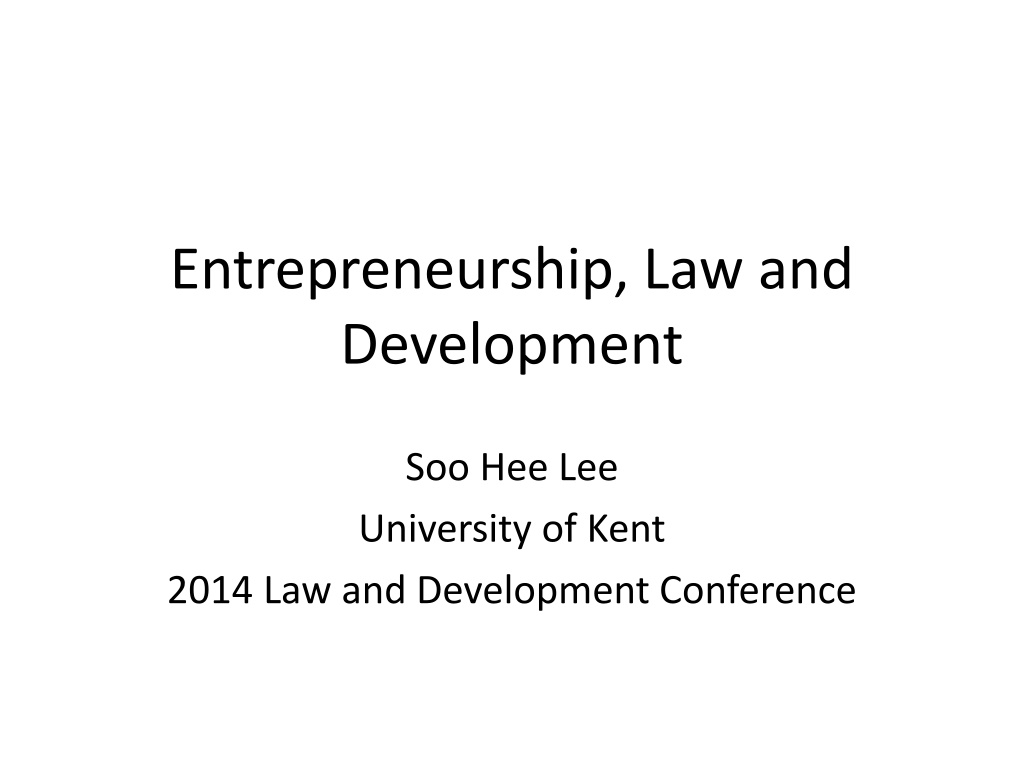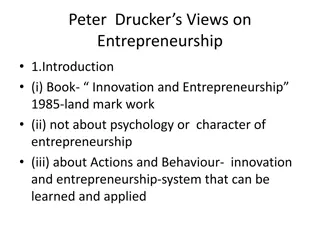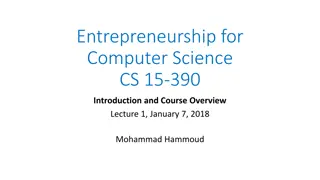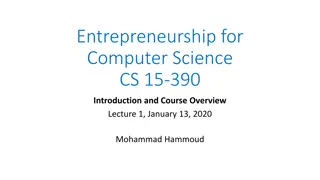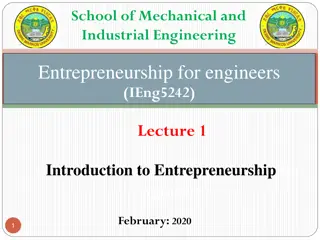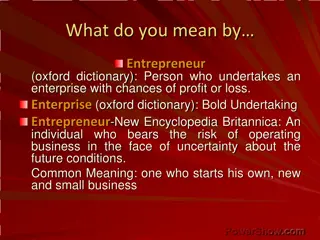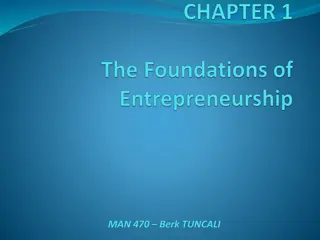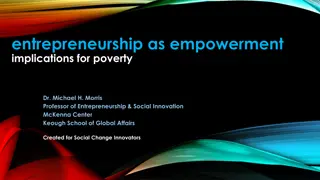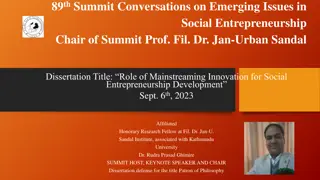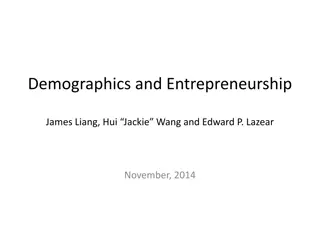Understanding Entrepreneurship, Law, and Development in Developing Countries
This text explores how the legal system of a developing country influences entrepreneurial opportunities within the neoliberal context. It discusses the impact of legal rationality, modern law, and intellectual mobilization on the entrepreneurial landscape, with a focus on China. The roles of Max Weber and Reinhard Bendix in shaping legal authority and societal conflict are also examined within the context of entrepreneurship. The influence of traditional and modern legal ideals, as well as the role of intellectuals in shaping legal systems, are highlighted to understand the interaction between law and development.
Download Presentation

Please find below an Image/Link to download the presentation.
The content on the website is provided AS IS for your information and personal use only. It may not be sold, licensed, or shared on other websites without obtaining consent from the author. Download presentation by click this link. If you encounter any issues during the download, it is possible that the publisher has removed the file from their server.
E N D
Presentation Transcript
Entrepreneurship, Law and Development Soo Hee Lee University of Kent 2014 Law and Development Conference
Introduction Entrepreneurship, law and development: How does the legal system of a developing country influence entrepreneurial opportunities within the neoliberal context? Max Weber and legal rationality Universally applied rules create an environment of equity in which the spirit of capitalism thrives based on the inner principles of each society. Reinhard Bendix and intellectual mobilization Legal authority is not always eliminating conflict, and intellectuals need to initiate and lead public debate in order to create or transform rules, eventually shaping a democratic society. How do these ideas fit in the context of contemporary China? Who are the entrepreneurs and how do they operate? How does the legal system facilitate or constrain entrepreneurial opportunities?
Law and Development Studies: Approaches and Issues Core conception and modern law : law as an order that fuels modernization and development through institutionalisation of social control (Trubek, 1972). The core conception as ethnocentric and evolutionist, so that transferability and legal reform from the West to developing countries is problematic (Trubek, 1972). Evolutionism versus reformism While modern law thinking argues that the rest of the world will repeat the Western experience of simultaneous legal and socioeconomic development, it also presupposes that legal development is not guaranteed and that strenuous efforts must therefore be made to ensure that modern law is adopted (Trubek, 1972, p.17). Legal instrumentalism versus the democratic state Legal instrumentalism may make the legal order increasingly dependent on state apparatus and such dependence will strengthen their position (Trubek, 1972, p.19).
Weber and Legal Rationality The Protestant Ethic deriving from Calvinism legitimizes the concentration of wealth, while inserting a set of norms and conventions (i.e. patriarchy) shaping the ideal type of capitalist entrepreneur (Weber, 1978). The entrepreneur as charismatic leader who initiates economic and social transformation within the constraints and norms of market relations. The traditional and rational-legal ideal types of legitimate domination: While they are supposed to ensure social justice based on commonly accepted rules and traditions, they accept the concentration of wealth that leads to class division between the bourgeois elite and the working class. Legal Rationality: to what extent a legal system is capable of formulating, promulgating, and applying universally applied rules (Trubek, 1972b, p.727). In Economy and Society, Weber s concern is how the noneconomic factors and institutions construct the law as a form of social guidance .
Bendix and Intellectual Mobilization Bendix compares traditional and modern societies in transformation, which derive from Weber s traditional and rational-legal ideal types. Bendix refuses that legal authority reduces or regulates social conflict: Legal authority is a relationship between elite and subordinate groups who share a conception of legitimate domination (Wiener, 1981, p.69). In Nation-Building and Citizenship, Bendix argues that intellectuals (and not the working class through social struggles) are the source of creating or transforming the system of rules that stems from a democratic ideology. Bendix has moved away from Weber in his characterization of authority in modern society (Wiener, 1981, p.80): Weber s view on modern authority is bureaucratic and democracy as such is opposed to the rule of bureaucracy (Weber, 1958, p.231). Bendix s modern authority promotes social justice when intellectual mobilization takes place in a democratic society.
Institution void and entrepreneurship in developing countries In an institutional void there are no clear rules and norms according to which politics is to be conducted and policy measures are to be agreed upon there are no generally accepted rules and norms according to which policy-making and politics is to be conducted (Hajer, 2003, p.175). According to Barrington Moore, in developing countries the choice is not between liberal democratic citizenship and totalitarianism, but rather between peasant revolution and neo-fascist counter-revolution (in Wiener, 1981, p.82). Legal rationality and intellectual mobilization are two alternatives that contrast the ways in which the comparative advantage of developing countries is based on exploiting institutional voids and legal instrumentalism. Intellectual mobilization and legal rationality may create an equal access to entrepreneurial opportunities.
Neoliberalism in the Chinese hybrid economy During the second half of the 20thcentury the reduction or elimination of tariffs opened new opportunities for firms to operate in an interdependent way due to gradual demise of protectionism and interventionism (Harvey, 2005). The neoliberal state creates a good business and investment climate for capitalistic endeavours (Harvey, 2005, p.70). Neoliberalism and legal instrumentalism pave the ways to the creation of a new elite. Chinese reform after Mao s depth in 1976 and the hybrid economy: From State Owned Enterprises (SOEs) to Township and Village Enterprises (TVEs) From State Owned Enterprises (SOEs) to Legal Person Ownership From State Owned Enterprises (SOEs) to Family Business Groups Entrepreneurship within the neoliberal context is expected to amplify social conflict : A few Chinese families have accumulated extraordinary wealth , while the regional inequalities (urban/rural) and (coastal/mainland) have been amplified. China s competitive advantage relies on cheap, powerless and flexible labour, has been fuelled by neoliberalism (Harvey, 2005, p.144)
Institutional voids in China Prior to 1978 reform, the dominant perception about entrepreneurship was negative, while after the reform the majority of Chinese see entrepreneurial activity as positive for the economy and society, as generating wealth and jobs: The country s small and medium-sized business sector now accounts for 75% of all new jobs created (Puffer et al., 2009, p.452). Local entrepreneurs are part of the political elite and as a result they exploit institutional voids by influencing the system of rules for their private benefit. Foreign direct investments create pressures for the emergence of legal rationality: Much of the recent attempts at formalizing Chinese institutional arrangements and developing a functioning legal system was a response to the need to attract outsiders and to establish a reliable basis for interacting with them (Puffer et al., 2009, p.454). Harvey (2005) and Puffer et al. (2009) shed light on two sides of China which co-exist, fuelling progress on the one hand, but being a constant source of inequality on the other.
Lessons from Weber and Bendix on entrepreneurship, law and development Weber implicitly and Bendix explicitly are against legal instrumentalism, which is perceived as undermining market rules and entrepreneurial opportunities. Entrepreneurship based on neoliberalism enables the exploitation of opportunities due to legal instrumentalism and institutional voids. The lesson from Weber and Bendix is that legal rationality and intellectual mobilization would shape better entrepreneurial conditions in developing countries, improving market regulation and equal access to resources. Intellectual mobilization and legal rationality are suppressed in China because of neoliberal pressures, coincided with the growth ambition of the Communist party, to exploit institutional voids that eventually give rise to legal instrumentalism, privileging national and international elites. In order to escape economic backwardness, China is shifting from production into consumption society, but at the same time is required to nurture social mobility (Gerschenkron, 1962).
Lessons from Weber and Bendix on entrepreneurship, law and development Following a Weberian approach, in the absence of legal rationality the entrepreneurial environment will progressively deteriorate because the concentration of wealth in a national elite will create pressures towards excluding the working and middle class, while the central authority will have to balance legal instrumentalism and coercive authority. Approaching law and development studies through the lens of entrepreneurship, we move beyond reformism and transferability, as developed and developing countries are increasingly interconnected and exposed to negative effects that stem from institutional voids. Instead of emphasizing issues of reforming and transferability, law and development studies could focus on: analysing long-term effects of institutional substitution (or innovation) and their transformation shaping the conditions for intellectual mobilization and democratization in developing countries.
References Bendix, R. (1980). Kings or People: Power and the Mandate to Rule. Berkeley, Los Angeles, London: University of California Press. Bendix, R. (1977). Nation-building and Citizenship: Studies of our Changing Social Order. Univ. of California Press. Bendix, R. (1959). Max Weber: An Intellectual Portrait, London: Methuen & Co. Gerschenkron, A. (1962), Economic backwardness in historical perspective, a book of essays, Cambridge, Massachusetts: Harvard University Press. Hajer, M. (2003). Policy without polity? Policy analysis and the institutional void , Policy Sciences, 36, pp.175-195. Harvey, D. (2005). A Brief History of Neoliberalism, Oxford: Oxford University Press. Trubek, D. & Santos, A. (2006). The New Law and Economic Development: A Critical Appraisal, Cambridge: Cambridge University Press. Trubek, D. (1972b). Max Weber on Law and the Rise of Capitalism , Wis. L. Review, 31, pp.720-753. Weber, M. (2002). The Protestant Ethic and the Spirit of Capitalism: and other writings. Penguin. Weber, M. (1978). Economy and society: An outline of interpretive sociology. Univ of California Press.
